How to deal with withdrawal and detox symptoms

Understanding Withdrawal and Detox
Withdrawal and detoxification can be formidable stages in the journey to overcoming substance dependency. These processes involve both physical and emotional battles as the body and mind free themselves from addictive substances. It's crucial for those undertaking this journey to have a comprehensive understanding of strategies, coping mechanisms, and support systems that can aid in managing withdrawal and detox symptoms effectively. This article explores practical ways to tackle these challenges, offering insights into medical options, home-based methods, and the importance of professional and emotional support.
What Are Withdrawal and Detox Symptoms?
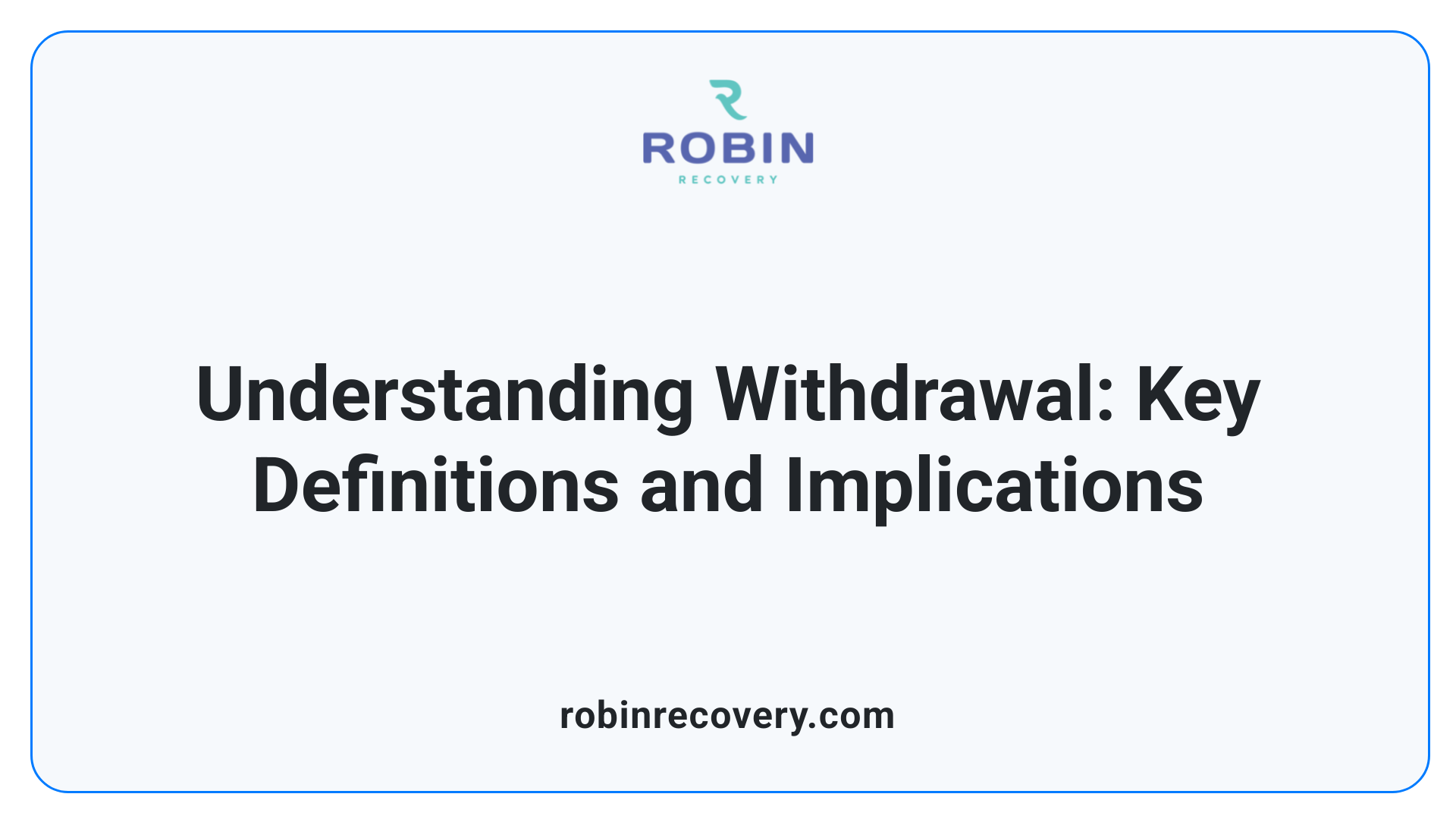
Defining Withdrawal and Detox
Withdrawal is a set of physical and mental symptoms that occur when a person reduces or stops using a substance they have become dependent on. This can happen after long-term use or in cases of high dosage. Detoxification, or detox, is the medical process of removing a substance from the body, which often requires supervision to ensure safety and comfort during the transition.
Common Symptoms Based on Substances
Symptoms of withdrawal can significantly vary based on the substance involved, and may include:
Substance Common Symptoms Severity Level Alcohol Anxiety, irritability, nausea, tremors, seizures Potentially severe Opioids Agitation, muscle aches, nausea, vomiting Unpleasant but not life-threatening Benzodiazepines Anxiety, sleep disturbances, risk of severe complications Very serious Nicotine Cravings, headaches, irritability Mild to moderate Cannabis Mood swings, anxiety, sleep problems Generally mild
Experiencing withdrawal can lead to psychological symptoms like depression and anxiety which may last longer than physical symptoms. It's vital to seek medical help for substance-specific management.
For more comprehensive assistance, the SAMHSA's National Helpline provides resources and guidance for those facing withdrawal and detox.
Understanding the Typical Duration of Detox
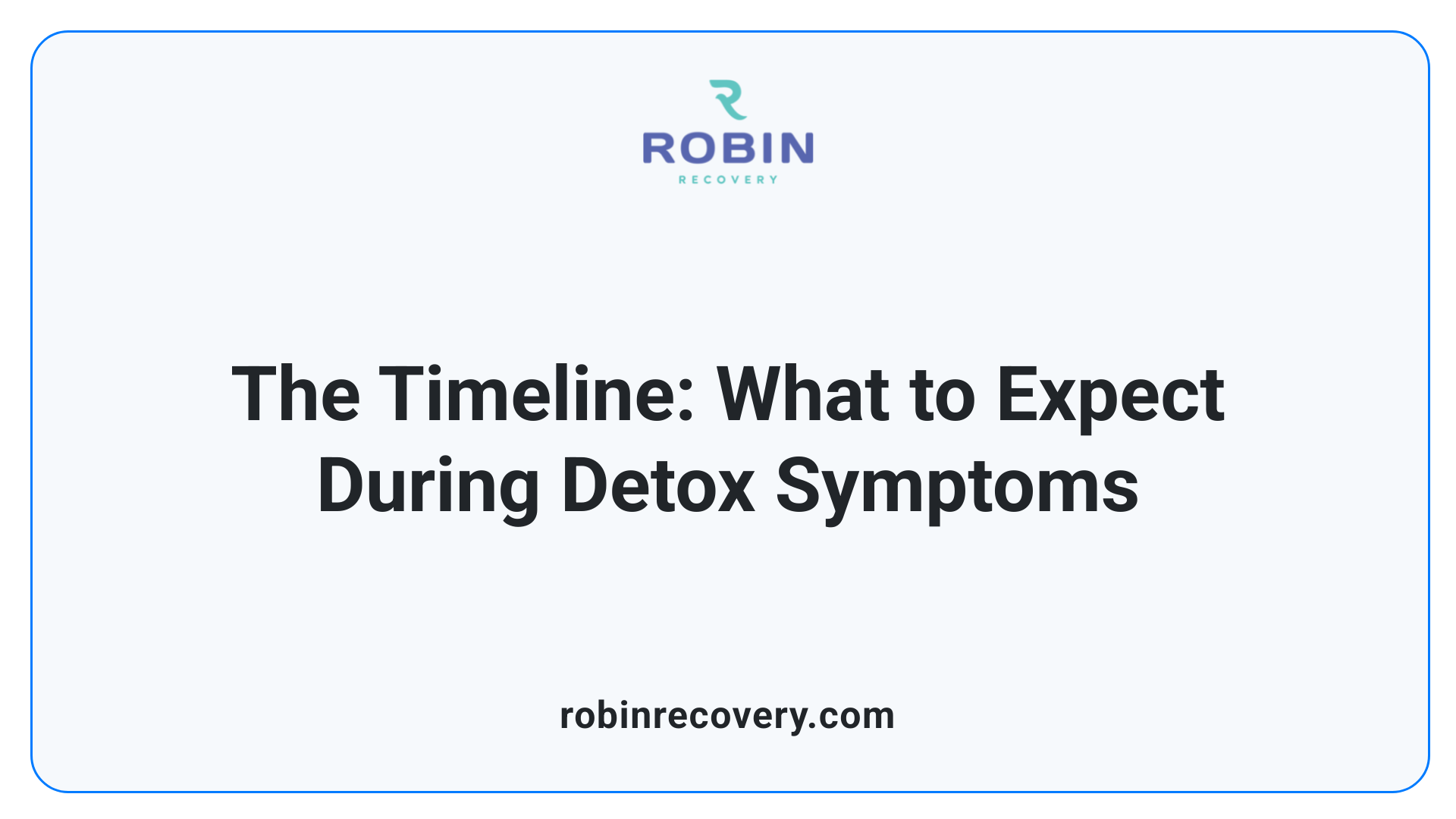
What is the typical duration of detox symptoms?
The duration of detox symptoms varies widely, primarily influenced by the substance of dependence and the individual's overall health. Generally, detox symptoms can last from a few days to several weeks. For instance:
- Alcohol Detox: Symptoms usually begin within 6 to 24 hours after cessation and may peak between 48 and 72 hours. These symptoms can last 7 to 10 days, though some individuals may continue to experience effects for weeks.
- Opioid Withdrawal: Symptoms typically commence 8 to 24 hours after the final dose, with a duration of 3 to 10 days, depending on usage patterns.
- Benzodiazepines: Symptoms often start within 1 to 4 days, peak within the first two weeks, and can persist for months in some cases, indicating a need for comprehensive medical support.
Factors affecting the duration
Several factors contribute to the duration of detox symptoms:
- Substance Type: Different drugs may result in varied withdrawal experiences, with some substances causing longer-lasting symptoms.
- Severity of Use: Chronic use or high doses often culminate in more intense and prolonged withdrawal symptoms.
- Individual Health: Factors such as age, mental health conditions, and overall physical health play significant roles.
Seeking medical supervision during the detox process is crucial for safe management of symptoms and recovery.
Effective Strategies to Tackle Withdrawal
Medical interventions
Seeking professional help is crucial when dealing with withdrawal from substances like alcohol and opioids. Supervised medical detox provides the necessary medical oversight to manage potentially severe withdrawal symptoms safely. Medications such as benzodiazepines, clonidine, buprenorphine, and methadone can be prescribed to alleviate symptoms and cravings, thus making the process more bearable.
Additionally, healthcare professionals can monitor vital signs, provide hydration, and ensure comfort, reducing the risk of complications during withdrawal.
Self-care practices at home
Taking care of oneself during withdrawal is essential for recovery. Here are some effective self-care strategies:
- Stay Hydrated: Drink plenty of water to combat dehydration caused by potential vomiting and sweating.
- Gentle Exercise: Activities like walking or yoga can help improve mood and relieve muscle tension.
- Nutrition: Eating balanced meals rich in fruits, vegetables, and carbohydrates can support physical recovery and reduce cravings.
- Comforting Activities: Pamper yourself with relaxing baths or massages, and keep yourself entertained with enjoyable hobbies.
- Join Support Groups: Engage with others who understand your struggles, offering mutual support and motivation.
Utilizing these strategies can significantly alleviate withdrawal symptoms and provide a strong foundation for recovery.
Coping Mechanisms for Withdrawal
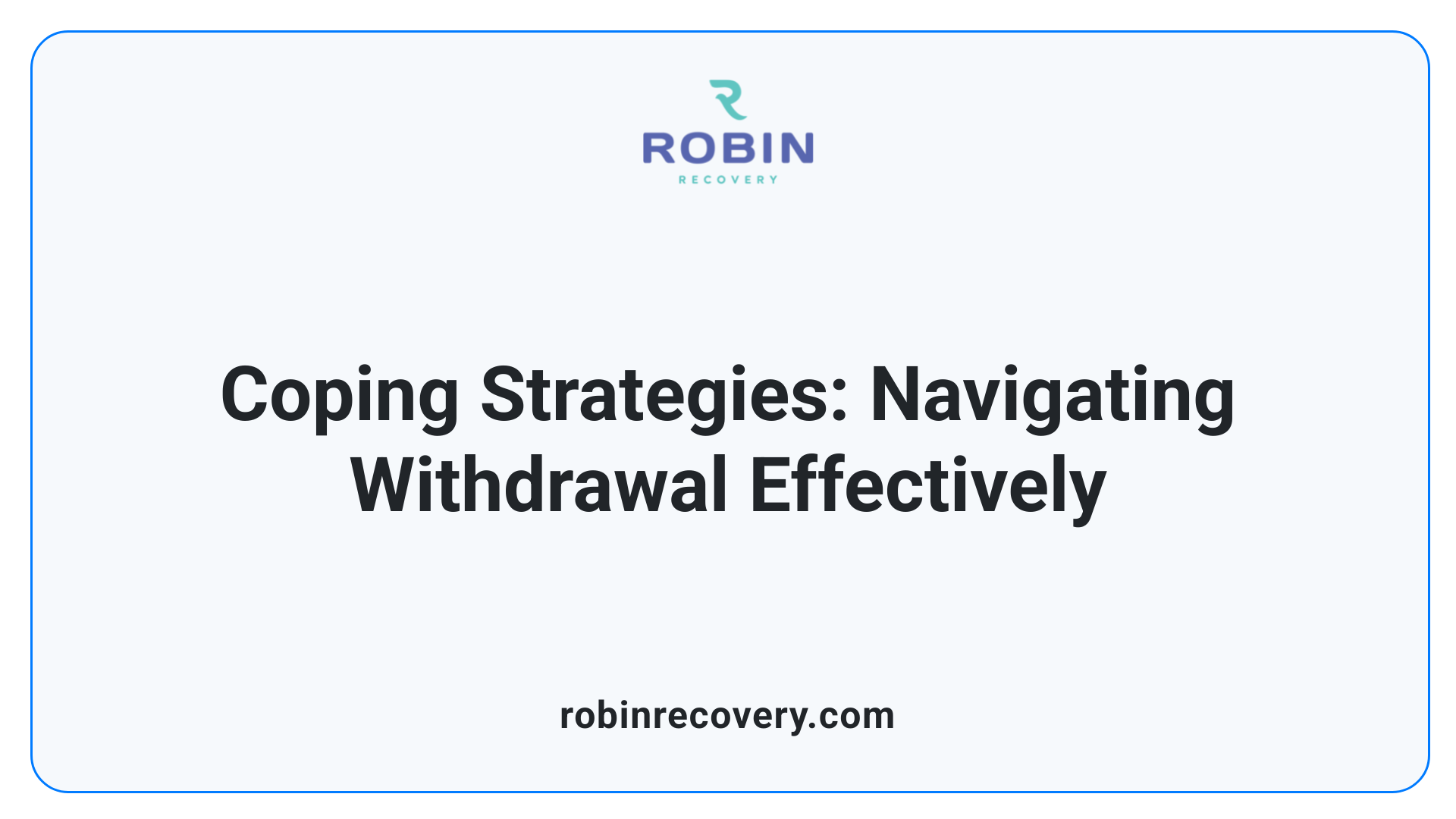
What are some coping mechanisms to manage withdrawal safely?
Coping with withdrawal is crucial for a smoother recovery process. Here are some effective strategies:
Utilizing Support Systems
- Connect with Professionals: Reach out to counselors, support groups, or helplines like SAMHSA’s National Helpline (1-800-662-HELP) for ongoing guidance.
- Lean on Friends and Family: Maintaining open communication with a trusted support person can provide emotional stability and help manage cravings.
Stress-Relief Techniques
- Practice Relaxation Skills: Techniques like deep breathing, meditation, and gentle yoga can alleviate anxiety and promote mental clarity during withdrawal.
- Stay Active: Engaging in physical activities can release endorphins, improving mood and distracting from discomfort.
- Nutrition and Hydration: Maintaining a balanced diet and drinking plenty of water is essential for understanding mood swings and reducing withdrawal symptoms such as nausea and fatigue.
Utilizing these coping mechanisms can help manage the challenges associated with withdrawal, fostering a supportive environment for recovery.
Overcoming Emotional Withdrawal
How can one overcome emotional withdrawal symptoms?
Overcoming emotional withdrawal is challenging but possible with the right strategies. Recognizing that symptoms such as depression, anxiety, and mood swings are temporary is an essential first step.
- Engage in relaxation techniques: Practicing yoga, meditation, or deep breathing can help alleviate feelings of anxiety and promote a sense of calm.
- Adopt a healthy lifestyle: Eating a balanced diet, staying hydrated, and getting enough sleep are crucial for maintaining emotional stability during withdrawal.
- Seek emotional support: Connecting with family, friends, or support groups can provide a sense of community and understanding, significantly easing emotional burdens.
It's also important to consult a healthcare professional if emotional symptoms persist or become overwhelming. They can provide guidance, treatment options, and support needed during this vulnerable time, ensuring that the recovery process is both safe and effective.
Ultimately, building a solid support network and actively engaging in self-care can empower individuals to navigate the emotional challenges associated with withdrawal.
Role of Nutrition and Hydration
Importance of Diet and Hydration
Maintaining proper nutrition and hydration is vital during the detox process to help alleviate withdrawal symptoms. A balanced diet not only supports the body in recovering from substance use but also helps reduce mood swings and cravings. Staying hydrated can minimize irritability and physical discomfort, enhancing overall well-being.
Foods That Aid Detox
Incorporating specific foods into the diet can significantly aid detoxification:
- Fruits and Vegetables: Rich in vitamins and antioxidants, they help in restoring the body’s balance.
- Whole Grains: Provide sustained energy and help maintain stable blood sugar levels.
- Lean Proteins: Foods like chicken, fish, and legumes support muscle repair and overall recovery.
- Hydrating Foods: Water-rich fruits like watermelon and cucumber can enhance hydration levels while supplying essential nutrients.
Implementing these dietary changes can improve physical and mental states throughout the withdrawal experience.
Importance of Professional Detox Support
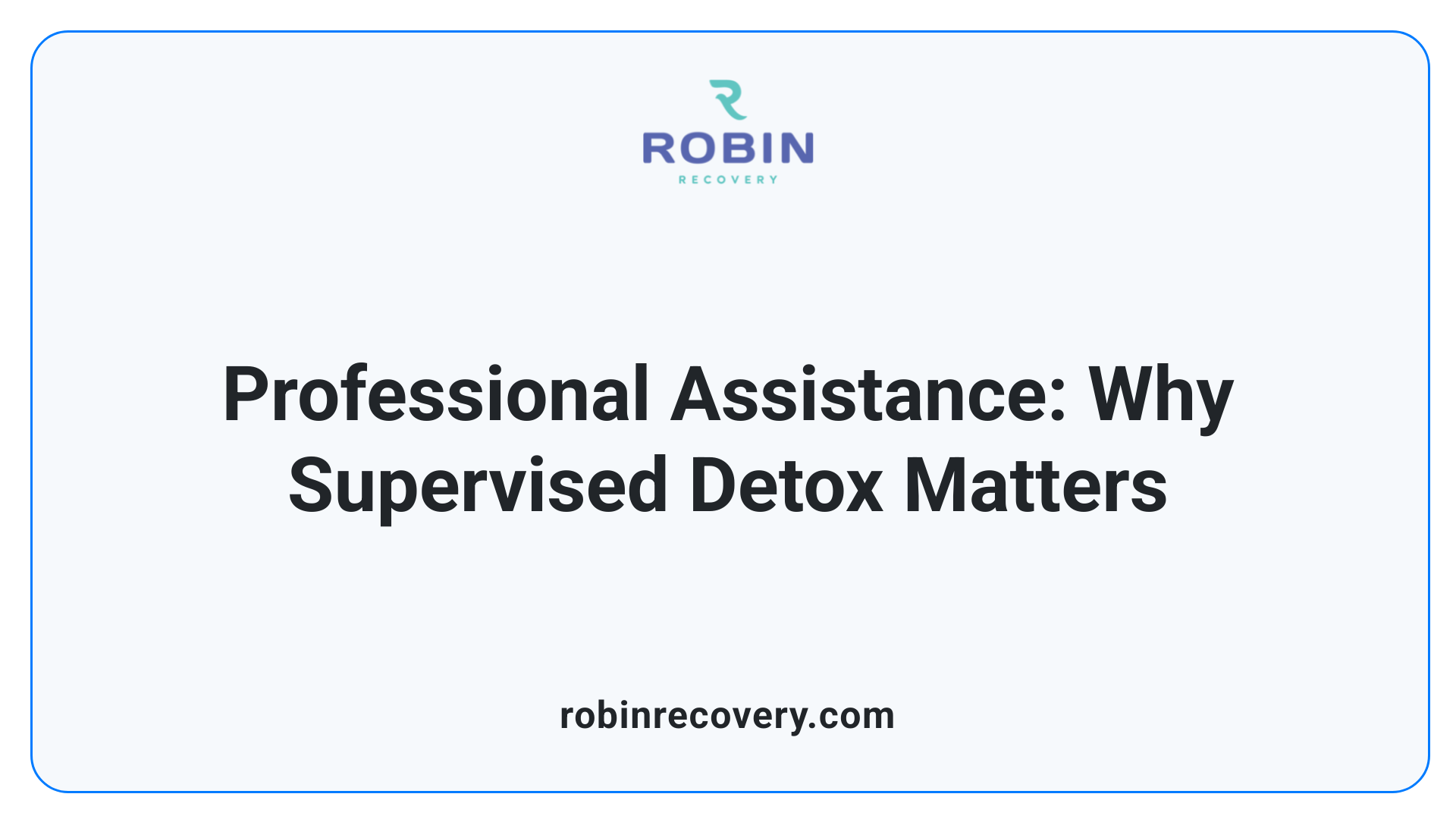
Benefits of Professional Help
Seeking professional detox support is crucial for managing withdrawal symptoms safely and effectively. Medical supervision can provide many advantages:
- Monitoring: A dedicated healthcare team is available 24/7 to monitor vital signs and manage any complications.
- Medication: Professionals can prescribe medications that mitigate withdrawal symptoms and facilitate a more comfortable experience, particularly for substances like alcohol and opioids.
- Guided Support: Counselors and support groups can help address underlying issues, preparing individuals for ongoing recovery after the acute phase of withdrawal.
Risks of Home Detox for Certain Substances
While some may consider home detox, it poses significant risks, especially for substances such as alcohol and benzodiazepines:
- Severe Withdrawal Symptoms: These can include hallucinations, seizures, and delirium, which may be life-threatening without proper medical intervention.
- Lack of Support: Home environments may not provide the necessary calm atmosphere or safety measures, increasing the risk of relapse.
In short, professional detox provides a safety net that is essential for a successful recovery journey.
Home-Based Withdrawal Strategies
Conditions for Home Withdrawal
Home-based withdrawal can be a viable option for individuals experiencing mild to moderate withdrawal symptoms, especially when they have supportive friends or family. However, before pursuing this method, consulting with a healthcare professional is essential. A professional evaluation can help identify any potential complications or additional needs for medical care.
Steps to Improve Safety and Support at Home
Implementing specific strategies can enhance safety during home-based withdrawal:
- Create a Supportive Environment: Ensure that no drugs or alcohol are present in the home to minimize temptation.
- Involve a Support Person: It's crucial for someone to be present to assist and monitor the individual undergoing withdrawal. This person should understand their role and the withdrawal symptoms linked to the specific substance involved.
- Establish a Calming Atmosphere: A quiet and calm environment encourages rest and relaxation, essential during withdrawal.
- Nutritional Support: Maintaining a balanced diet and staying hydrated can alleviate symptoms like mood swings and cravings. Encourage the individual to eat wholesome foods and drink plenty of water.
- Encourage Documentation: Suggest that they write down their reasons for quitting, which can provide motivation during challenging moments.
By following these steps, the home environment can be optimized for a safer and more supportive withdrawal experience.
Understanding Substance-Specific Symptoms
Withdrawal Symptoms for Specific Substances
When an individual stops or reduces their usage of addictive substances, withdrawal symptoms can emerge, fluctuating widely based on the substance involved. Common physical symptoms include:
- Alcohol: Shaking, sweating, anxiety, nausea, and in severe cases, seizures and delirium tremens, which can be life-threatening.
- Opioids: Symptoms such as agitation, muscle aches, anxiety, vomiting, and abdominal cramping, typically starting 8-24 hours after the last dose.
- Benzodiazepines: Increased anxiety, sleep disturbances, and potentially severe reactions requiring medical management.
Customized Management Protocols
Management of withdrawal symptoms is tailored to the specific substance and the individual. Here are some key management strategies:
Substance Common Symptoms Management Approaches Alcohol Shaking, agitation, nausea Benzodiazepines for symptom control; supportive environment. Opioids Anxiety, muscle pain, nausea Methadone or buprenorphine for easing cravings and symptoms. Benzodiazepines Anxiety, muscle tension, seizures Gradual tapering under medical supervision to prevent severe withdrawal. Stimulants Fatigue, irritability, depression Behavioral therapies and support to manage cravings and mood swings.
Each protocol involves a focus on medical supervision and supportive care to ensure safety and comfort during the detox process.
Best Practices for a Safe Detox Environment
Creating a calming environment
Setting up a serene and supportive space is crucial for individuals undergoing detoxification. A quiet environment helps foster rest, which is essential as the body adjusts to the absence of substances.
- Remove Substances: Ensure all drugs or alcohol are out of the house to minimize temptation.
- Encourage Comfort: Use soft lighting, comfortable furnishings, and calming scents like lavender to promote relaxation.
- Limit Noise: Keep distractions to a minimum; opt for soothing music or nature sounds if desired.
Continuous monitoring
Medical supervision is pivotal during detox due to potential complications, especially from substances such as alcohol or benzodiazepines.
- Health Evaluation: Regular checks by healthcare professionals can identify any worsening symptoms or emerging risks.
- Support System: Involve a trusted friend or family member to provide emotional and practical support, ensuring they understand their role in the detox process.
Maintaining a safe and monitored environment can significantly improve recovery outcomes.
Long-Term Support and Relapse Prevention
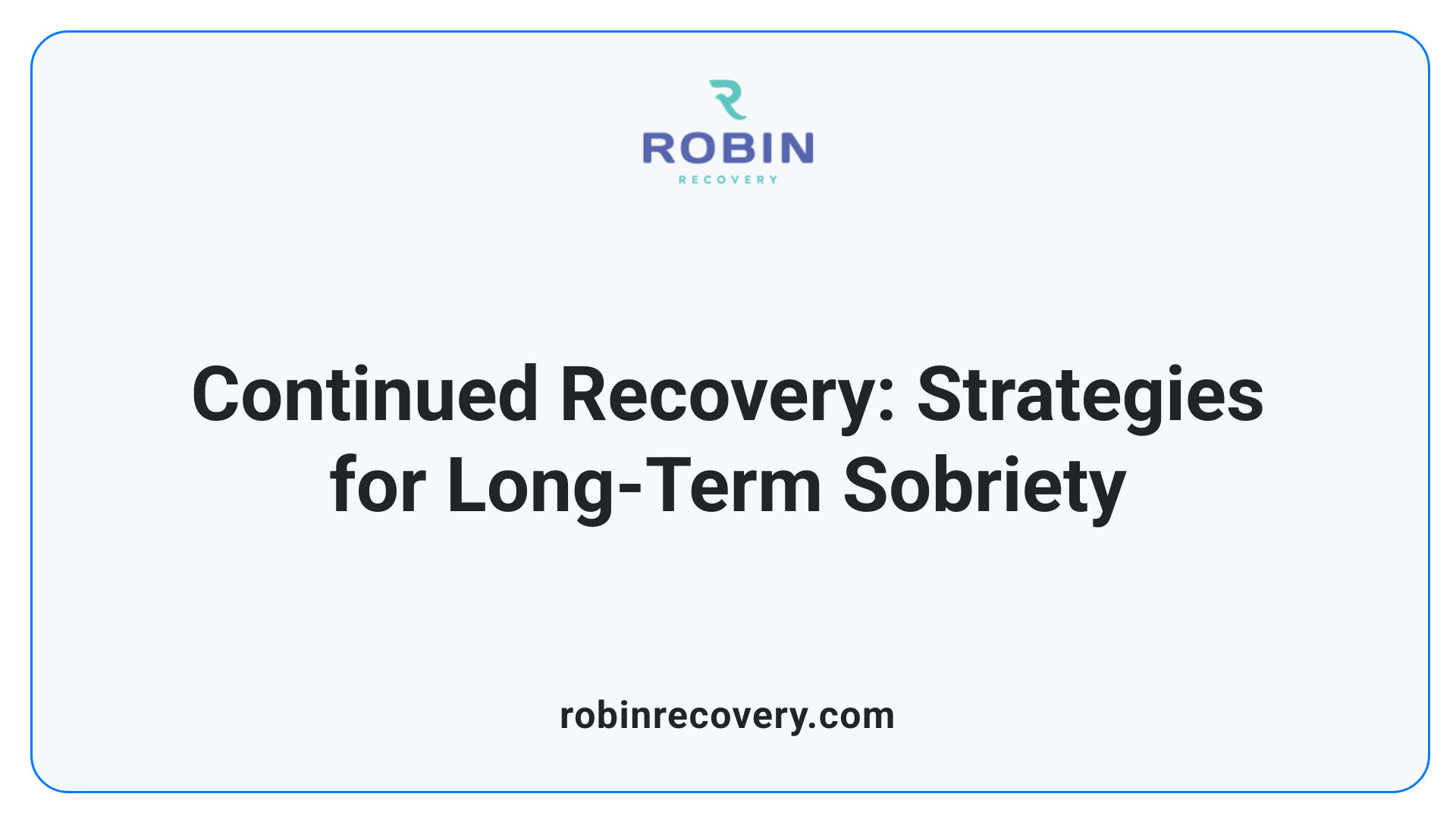
Post-detox Support Options
After detoxification, ongoing support is essential to maintain sobriety.
Supportive options include:
- Counseling: One-on-one sessions can help address the psychological aspects of addiction.
- Support Groups: Groups like AA (Alcoholics Anonymous) and NA (Narcotics Anonymous) provide community and accountability.
- Outpatient Programs: These often blend therapy with medication management, allowing individuals to engage in recovery while continuing daily activities.
Relapse Prevention Strategies
Preventing relapse is crucial after detox, and individuals can apply various strategies such as:
- Developing a Relapse Prevention Plan: Identifying triggers, developing coping strategies, and having a support system can significantly lower the risk of relapse.
- Engaging in Healthy Activities: Finding new hobbies or interests can distract from addiction triggers and facilitate a more fulfilling life.
- Practicing Stress Management: Techniques like meditation, yoga, or directed breathing can help manage stress, a common relapse trigger.
Support Options Examples Benefits Counseling Individual therapy Addresses mental health issues Support Groups AA, NA Builds community and accountability Outpatient Programs Therapy + medication Assists in daily recovery
These holistic approaches emphasize not just abstinence but ongoing growth and healing.
Moving Forward with Confidence
Successfully navigating through withdrawal and detox requires a blend of medical, psychological, and community support. Each individual's journey through withdrawal is unique, and understanding the right combination of strategies and supports can make a significant difference. Prioritizing safety, seeking professional assistance when necessary, engaging supportive networks, and maintaining a healthy lifestyle are all crucial steps in overcoming withdrawal and moving toward recovery.
References
- National Helpline for Mental Health, Drug, Alcohol Issues - SAMHSA
- Home-based withdrawal - Alcohol and Drug Foundation
- Withdrawal Management - NCBI
- How to Deal With Withdrawal Symptoms: 7 Tips That Can Help
- 11 Helpful Ways to Cope With Drug Withdrawal
- Opiate and opioid withdrawal: MedlinePlus Medical Encyclopedia
- Drug Withdrawal Symptoms, Timelines, and Treatment
- What's the Difference Between Detox and Withdrawal?
- 10 Ideas for Dealing with Withdrawal | Drug Abuse Recovery
